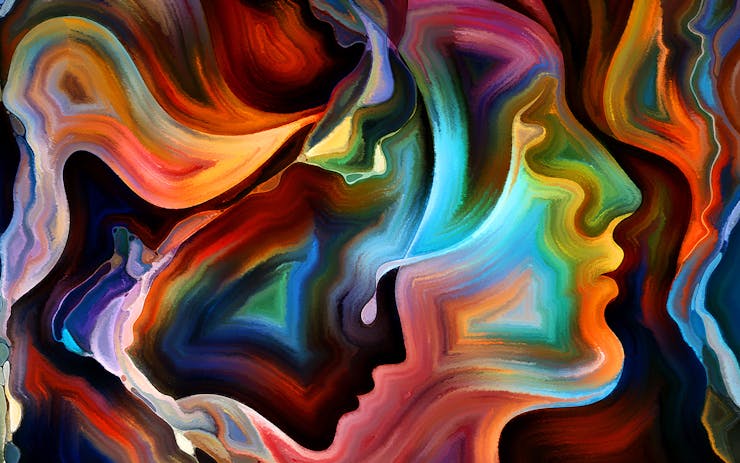Story Highlights:
- The brain goes through critical periods of development during childhood and adolescence, and exposure to THC during this time is an environmental risk factor for schizophrenia.
- While some studies claim that cannabis use plays a causal role in schizophrenia development, it can’t be ruled out that those who are more likely to develop schizophrenia are simply more prone to use.
- On its own, the effects of CBD on schizophrenia symptoms have been mixed. Some studies have shown CBD’s antipsychotic potential while others found no therapeutic link.
- CBD also has promise in improving the difficult-to-treat negative symptoms and cognitive impairment found in schizophrenia patients.
In the push for cannabis legalization, the link between cannabis and schizophrenia sometimes enters the discussion. Many fear that cannabis increases risk for developing schizophrenia, while others declare its value in helping relieve symptoms of the condition. But what does the research say about the role of cannabis in developing—and potentially treating—schizophrenia?
What Is Schizophrenia?
Schizophrenia refers to a group of conditions in which brain function is so impaired that sufferers lose touch with reality. It affects over 7.5 million adults in the United States, usually starting in their early 20s for men and slightly later in life for women.
Traditional treatments do little to treat negative symptoms such as a flat emotional state, a struggle to feel pleasure, and a lack of motivation to engage socially.
Psychosis isn’t the only defining feature of schizophrenia. The condition is a complex syndrome characterized by a range of symptoms that fall into positive, negative, and cognitive categories. Positive symptoms are the delusions, hallucinations, and disorganized speech that characterize psychosis and are associated with losing touch from reality. Pharmaceutical treatments for schizophrenia, called antipsychotic medications, target these positive symptoms.
Traditional pharmaceutical treatments, though, do little to treat negative symptoms such as a flat emotional state, a struggle to feel pleasure, and a lack of motivation to engage socially. They also fail to improve cognitive deficits, often leaving patients with impaired attention, memory, and problem-solving abilities.
The Schizophrenic Brain
Predicting who is going to develop schizophrenia is a challenge for health care providers as there are no clear structural brain changes that can be detected before symptoms arise. Instead, the development of schizophrenia begins with abnormal communication patterns between groups of brain cells.
The risk of experiencing psychotic episodes increases with THC dose.
The abnormal communication patterns found in schizophrenia present in multiple ways, but the most common are dysfunction in two types of brain chemical systems: glutamate and dopamine. These chemicals, also called neurotransmitters, are used by brain cells to communicate with one another by activating receptors on other brain cells.
Glutamate is one of the most common neurotransmitters in the brain, activating a variety of receptors, including NMDA receptors. Activating NMDA receptors is an important step in brain cells forming connections with one another, and they play a critical role in brain development, learning, and memory. Many individuals with schizophrenia have abnormally low NMDA receptor activity, which can impair brain development and cognitive performance. In some cases, it’s this low NMDA receptor activity that leads to the schizophrenia symptoms later in life.
Shop highly rated dispensaries near you
Showing you dispensaries nearThe other neurotransmitter commonly implicated in schizophrenia is dopamine. Schizophrenic brains typically exhibit abnormally high levels of activity in D2 dopamine receptors, which are found throughout the brain’s limbic system—the system that regulates our emotions and motivational states. Abnormally high D2 receptor activity can lead to a host of schizophrenia symptoms such as an impaired grasp of reality, emotional dysregulation, and weakened cognitive abilities. Antipsychotic medications work by blocking the activity of D2 receptors.
Cannabis and Schizophrenia Risk Factors
The abnormal connections between brain cells that cause schizophrenia symptoms are triggered by an interaction of genetic issues and environmental factors, such as childhood trauma or cannabis exposure. One genetic trait, on its own, is usually insufficient to cause schizophrenia, nor is an environmental factor like cannabis use on its own. Taken in concert, though, these factors can cause the risk of schizophrenia to spike.
CBD is thought to have antipsychotic effects, but the greatest evidence for its antipsychotic ability is through blocking THC-induced psychosis.
The brain goes through critical periods of development during childhood and adolescence. Exposure to THC, the high-inducing chemical in cannabis, during this time is a substantial environmental risk factor for schizophrenia. This risk stems from the importance of the endogenous cannabinoid system (ECS), specifically cannabinoid type I (CB1) receptors, in controlling how neurons connect and communicate with one another. Indeed, there is evidence that THC can cause psychotic episodes immediately after using cannabis, some of which can persist after the effects of THC and require clinical intervention. The risk of experiencing these psychotic episodes increases with THC dose.
The association between cannabis and schizophrenia is well-established; it’s been estimated that 8% of worldwide cases of schizophrenia can be attributed to cannabis. It should be noted, however, that while some studies claim that cannabis use plays a causal role in schizophrenia development, it can’t be ruled out that those who are more likely to develop schizophrenia are simply more prone to use cannabis.
It’s also worth noting that the cannabinoid composition of cannabis is often not considered in these studies. What about other cannabis constituents like cannabidiol (CBD), which has been found to have some antipsychotic properties?
Why the THC Risk?
As noted, genetic factors alone aren’t sufficient to cause schizophrenia. But when THC hits the brain, it may act as an environmental trigger for the condition. Evidence that THC exacerbates the genetically-determined risk of psychosis is found in brain cell connections. THC activation of CB1 receptors reduces the brain chemical, glutamate, which in turn, reduces NMDA receptor activation (see above). When THC activates CB1 receptors, it impairs glutamate production, which in turn lowers activity among NMDA receptors, ramping up the risk for the onset of schizophrenia.
THC exposure can also impact dopamine receptors like D2. When D2 receptor activation is elevated, the brain cells in the limbic system become overly sensitive. In a normal brain, CB1 receptors reduce this sensitivity and contribute to normal brain activity. However, too much THC can weaken the strength of CB1 receptors, leading to an overall elevation of dopamine levels, elevated D2 receptor activity, and the psychosis that can accompany it.
How Does CBD Affect Schizophrenia?
The non-intoxicating cannabinoid CBD is being considered as a treatment for schizophrenia. CBD is thought to have antipsychotic effects, but the greatest evidence for its antipsychotic ability is through blocking THC-induced psychosis. On its own, the effects of CBD on schizophrenia symptoms have been mixed. In one report, CBD did not improve psychotic symptoms in patients that responded poorly to traditional antipsychotic treatment. A larger study, though, found that CBD effectively reduced psychotic symptoms.
CBD also has promise in improving the difficult-to-treat negative symptoms and cognitive impairment caused by schizophrenia. Studies in animals found that CBD improved some of the negative symptoms such as social interaction deficits and working memory deficits.
One significant benefit of CBD, should it prove to be an effective antipsychotic medication, is that it’s well-tolerated and has fewer side effects compared to traditional antipsychotics. For instance, CBD doesn’t impact food intake or weight gain which is a common adverse side effect of antipsychotic medications. More work is needed to hash out these variable effects in humans, but in the meantime, keep the potential risks of THC in mind if you’re at all concerned about cannabis’ effect on schizophrenia.






